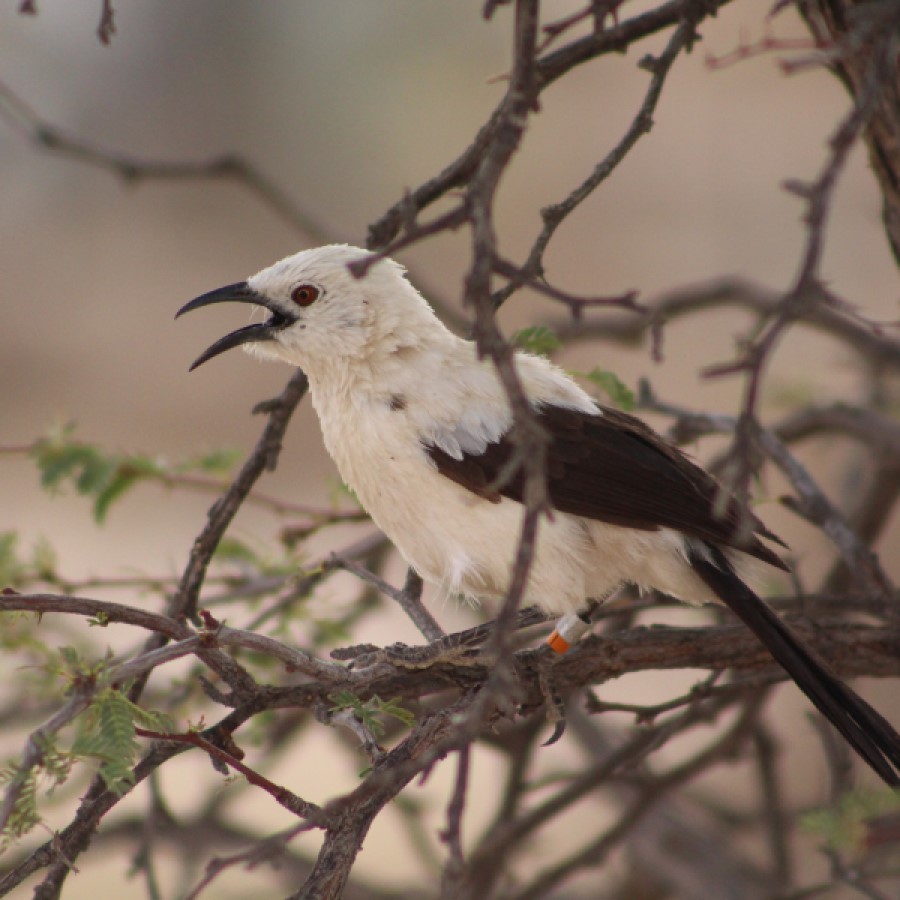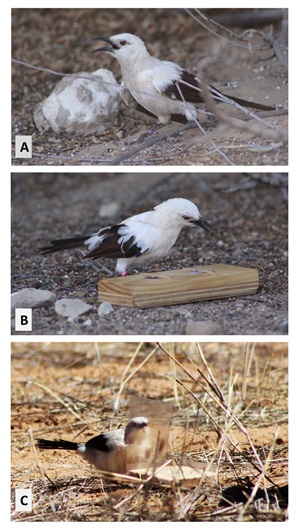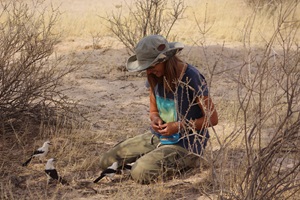Dr. Camilla Soravia tells us about the research published in her new Proceedings B paper, a study which examined the effect of high temperatures on the cognitive abilities of the Southern pied babbler.

The Southern pied babbler is a species of bird that inhabits the Kalahari desert in southern Africa, an area of the world that is experiencing hot, rapidly warming summers. A new study in Proceedings B examined the effect of high temperatures on the cognitive abilities of these birds. Lead author, Dr. Camilla Soravia, from the University of Western Australia, tells us more about this work.
Summary of the paper
Imagine taking an exam during a hot summer day with no air conditioning on… struggling? You would not be the only one. Research has repeatedly shown that humans can suffer cognitive decline under heat stress, which affects student performance in schools and represents an occupational health hazard worldwide. Surprisingly, until recently, we had not considered that animals in the wild might experience a similar phenomenon. With climate change leading to more frequent and severe heatwaves, it is crucial to understand how high temperatures may affect animal cognition - the way animals process information from the environment. This knowledge is vital because cognition helps animals to navigate environmental challenges, and in some cases, can determine survival and reproductive success in the wild.
One area of the world with hot, and rapidly warming, summers is the Kalahari desert in southern Africa. This region is inhabited by a species of birds called Southern pied babblers. In our study, we decided to test whether high temperatures affect their ability to learn new information, update what they learnt and control counterproductive behaviours. We built cognitive tasks to test each of these abilities and presented them to birds in the wild during mild and hot days. In the associative learning task, individuals had to learn which of two coloured lids hid a food reward. Once completed, we rewarded the other coloured lid to test their ability to reverse the learnt association. Finally, in the inhibitory control task, they had to stop their instinct of pecking at a transparent barrier and instead detour around it to retrieve a food reward.

We found that at 38 °C, pied babblers took twice as long to learn which colour hid the food reward compared to milder temperatures, showing that their ability to learn an association was significantly impaired. We did not find that they took longer to reverse the learnt association at high temperatures, but many individuals failed to complete this test, so we could not definitively establish the impact of temperature on reversal learning. Finally, in the inhibitory control task, we found that females but not males, took longer to refrain their instinct of pecking at the transparent barrier as temperatures increased.
Our work provides some of the first proof of cognitive decline in a wild animal under high temperatures and shows that the extent of this decline depends on the cognitive ability measured and attributes of the individual, such as sex. Cognitive impairment due to high temperatures is concerning, as it may limit animals’ ability to adjust their behaviour to a changing environment. Future research is needed to determine how widespread this effect is across different animal species and its consequences for survival and reproduction in the wild.
How did the idea of the paper come about?
The Pied Babbler Research Project, founded by senior author Associate Prof. Amanda Ridley, has provided evidence of multiple negative effects of high temperatures on pied babblers’ lives, including a decline in their ability to catch prey during foraging and to raise young at high temperatures (e.g. Du Plessis et al. 2012, Bourne et al. 2020). On the other hand, recent work on Western Australian magpies lead by co-author Dr. Benjamin Ashton, in collaboration with Associate Prof. Amanda Ridley and Prof. Alex Thornton, has provided one of the first proofs that cognition predicts reproductive success in a wild bird (Ashton et al. 2018), highlighting the importance of cognition for wild animals. We knew from the human literature (e.g. Schmit et al. 2017) that heat stress can cause cognitive impairment, so we merged methodologies from the two research threads and decided to investigate this important knowledge gap - whether high temperatures affected cognitive performance in a wild bird.

About the authors
Dr. Camilla Soravia is a postdoctoral researcher working at the Centre for Evolutionary Biology of the University of Western Australia. Her research focuses on the effects of rising temperatures on cognition and behaviour in wild birds.
Dr. Benjamin Ashton currently holds a DECRA Fellowship at Macquarie University in Sydney, Australia and is also affiliated with the University of Western Australia and the FitzPatrick Institute of African Ornithology at the University of Cape Town, South Africa. Ben’s research focuses on the causes and consequences of individual variation in cognitive performance.
Prof. Alex Thornton is based at the Centre for Ecology and Conservation of the University of Exeter, UK. One of the main aims of his research is understanding how environmental challenges, including anthropogenic change, shape animal cognition. More broadly, his research investigates cognition, behaviour and cultural evolution.
Associate Prof. Amanda Ridley established and currently leads the long-term Pied Babbler and Western Australian Magpie Research Projects. She is a behavioural ecologist based at the University of Western Australia and is an Honorary Research Associate at the FitzPatrick Institute of African Ornithology at the University of Cape Town, South Africa. Her research focuses on wild animals, often birds, using non-invasive procedures to investigate cooperative breeding, sociality, and cognition, including exploring the relationship between cognition and anthropogenic stressors.
Proceedings B is looking to publish more high-quality research articles and reviews in animal behaviour. If you have an idea for a review, we strongly encourage you to submit a proposal by completing our proposal template and sending it to the journal. More information about the journal and the submission process can be found on our website.
--------------------------------------------------------------------------
Image credits:
Hero image: A pied babbler panting while perching. Credit: Nicholas Pattinson.
Image 1: A figure from the paper showing pied babblers interacting with the cognitive tasks in the heat. Credit: Nicholas Pattinson.
Image 2: A photo of lead author Camilla Soravia with the birds. Credit: Nicholas Pattinson.





